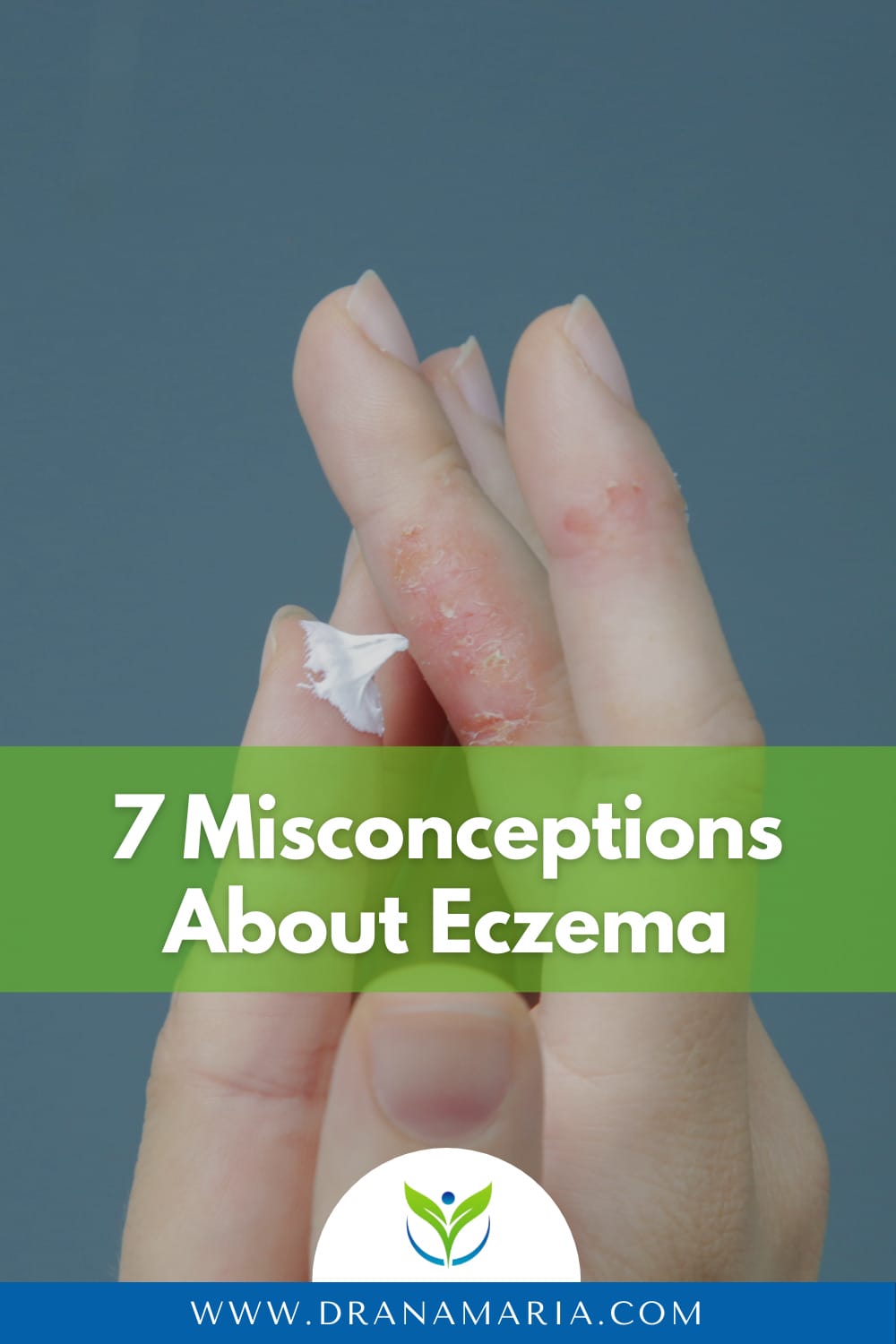Before diving into the 7 misconceptions about eczema…I think we need to start this with a fascinating story about misconceptions in modern medicine.
In 1981, at a small hospital in Perth, Australia, a young medical resident in training named Barry Marshall was looking for a research project. He was completing his gastroenterology rotation which largely consisted of seeing patients with painful peptic ulcers. It was commonly accepted at the time that ulcers were caused by stress, spicy foods, and too much acid in the stomach.
In fact, when Marshall encountered one of his first patients with findings of inflammation and early ulceration on endoscopy he wrote, “I gave the patient a prescription for antidepressants and referred her to psychiatry for evaluation”. This was the common thinking at the time likely related to the way ulcers were first diagnosed.
We Must Question Assumptions
Early in the 20th-century, x-ray machines were able to reveal severe gastric ulcers in patients. But these early machines were typically only available in large cities, and the only people with the financial resources to have these tests were businessmen – typically in high stress environments. Thus the first misconception was born that stress causes these ulcers and the resulting treatments were “stress relief” measures. Many thousands of prescriptions for antidepressants and antianxiety medications were written in the name of ulcer treatment – with NO benefit.
One of the pathologists in Marshall’s hospital, Robin Warren, had posted a research project to examine the stomachs of ulcer patients who had undergone resection of the ulcers. He had noticed peculiar spiral shapes on the biopsy specimens of many patients. Marshall jumped on the project and began to search all the biopsy specimens for these strange spiral shapes – and he found a connection.
They felt this was likely a bacteria contributing to ulcers and attempted to grow it in the lab – but initially were unsuccessful until they accidentally left one to incubate too long over an extended Easter weekend. And what did they find? The spiral shapes growing were in fact bacteria.
The Mysterious Spiral Shapes Marshall and Warren Found

But the medical community at the time refused to believe that bacteria could grow in the highly acidic environment of the stomach. So this second misconception led to Marshall and Warren being ignored for years as they presented more and more convincing data at international meetings and in journals. They desperately tried to create an animal model in rats, but were unaware at the time that this particular bacteria only grew in primates.They also failed with pigs which Marshall personally fed at the hospital.
So Marshall took an incredibly bold step – he had an endoscopy performed to prove his stomach was normal, and then while quipping, “Well, here it goes, down the hatch,” he drank a solution of the bacteria he had taken from a patient – Yuck! Within 3-4 days he became ill, developed abdominal pain, nausea and vomiting. He underwent repeat endoscopy 2 weeks later – low and behold he already had the classic findings of gastritis and early ulceration – with those telltale spiral bacteria.

Now he had his smoking gun! The medical community would surely listen to him now, but they dismissed him once again.
Have you ever been in a situation where you knew you were right but it went against popular sentiment? Have you been ridiculed or ostracized because you wanted to pursue a new course or direction? Were you told steroids were the answer to your eczema?
At the time, Marshall was up against another monumental challenge – big pharma. Marshall stated, “Tagamet and Zantac were among the world’s biggest-selling prescription drugs. Both these drugs were given to patients on the premise that too much stomach acid—created by stress and poor diet choices—is the cause of their ulcers.
As Marshall puts it, the “Acid Mafia”—pharmaceutical companies heavily invested in the old paradigm—was not enthusiastic about the researchers’ assertion that ulcers were infections that could be cured by a short, relatively low-cost regimen of antibiotics.
Marshall Became Enemies with Big Pharma – AKA the “Acid Mafia”

But Marshall didn’t give up, and finally after 10 years of fighting, the medical community finally relented by admitting that the cause of ulcers in 80% of people is infection by Helicobacter Pylori, those spiral shapes he first saw 15 years prior.
The Nobel Prize
In 2005, Marshall and Warren were awarded the Nobel prize in medicine for their detective work on Helicobacter Pylori. “The greatest obstacle to discovery,” says Marshall, “is not ignorance—it is the illusion of knowledge.” And it seems much of western medicine is so confident in their “knowledge” that they discard all other evidence.
When did physicians stop being true detectives? When did we stop looking for the root cause of disease and just resort to treating symptoms and putting more money in pharmaceutical company pockets?
With that premise in mind, let’s put on our Sherlock Holmes’ cape and look at the 7 misconceptions of eczema below!
7 common misconceptions of eczema
1. Eczema is a skin disease
- If you follow my blog, I hope you realize by now that eczema is NOT just a skin disease. The skin is a window into the gut – and when our skin isn’t happy, neither is our gut. I believe it’s nature’s way of telling us there is a problem inside. Treating eczema is about healing from the inside out. Pharmaceutical companies want you to believe the opposite – just like Marshall, if you get to the root cause and heal from the inside out, the big pharma mafia loses billions.
2. Eczema is Incurable
- First of all, I think it’s important to differentiate “healing” from “curing”. Curing implies someone or something else has eradicated the disease, whereas healing implies your body has done the work of ridding the disease. I believe if we correct and optimize our immune systems, we will allow our bodies to heal eczema on their own.
3. You Can Resolve Eczema with Diet Alone
- Although food is often implicated in the development of eczema, it is not the only factor. The origins of eczema are complex and multifaceted – thus we must approach the treatment from many angles including: environmental factors like cleaners and toxic chemicals, stress, histamines, parental factors, vitamin and mineral deficiencies, skin microbiome considerations, and much more.
4. If You Could Just Find the ONE Thing, The Eczema Will Resolve
- Eczema creams, topicals, and medications are a billions of dollars a year industry. Companies are banking on the fact you will keep trying dozens of products to find the “one” miracle cure. Remember the old saying, “if it seems too good to be true it probably is?” The average American family spends nearly $4,000 per year on a child with moderate to severe eczema. Unfortunately, healing eczema typically means making some hard lifestyle changes and acknowledging that the big red “easy button” doesn’t exist.
5. Genetics Determine Who Will Develop Eczema
- Many families believe that eczema is in their genes, and thus they have no control over its development. I could NOT disagree more – genetics may load the gun, but our environment/lifestyle/diet/stress pulls the trigger. The entire field of epigenetics has shown us that genes are NOT the sole determinant of disease, but just one factor in the ultimate development of diseases like eczema. And we can alter the way our genes are expressed which in turn lessens our risk of chronic disease.
6. Kids Will outgrow eczema
- Many parents assume eczema is like diaper rash or teething, and that with time it will resolve on its own. The reality is 10%-30% of kids will have eczema that lasts well into adulthood. In fact, every adult American has a 1 in 10 chance of developing eczema in their lifetime. Eczema is an external sign of other issues lurking below the surface. We must start the process of root cause analysis to find why eczema has started in your child.
7. Eczema Typically Begins at 3-6 months of Life
- Although the first physical signs of eczema may not appear until the first few months of life, the disease process has usually started before birth. A number of pre-birth factors such as: maternal diet, maternal stress, maternal and paternal microbiomes, birth method (c-section versus vaginal), and medications during pregnancy and at delivery all play a role in eczema development.
Western medicine continues to direct treatments toward immune system suppression, which I am fundamentally opposed to. It’s like buying bigger and bigger buckets to bail out the sinking boat rather than just fixing the darn hole!
If you are interested in getting to the root cause of eczema in your family, check out my online program.
My Holistic Eczema Solution
Yours in Good Health,
Drs Ana-Maria and John Temple
Was this helpful? Save it for later!





